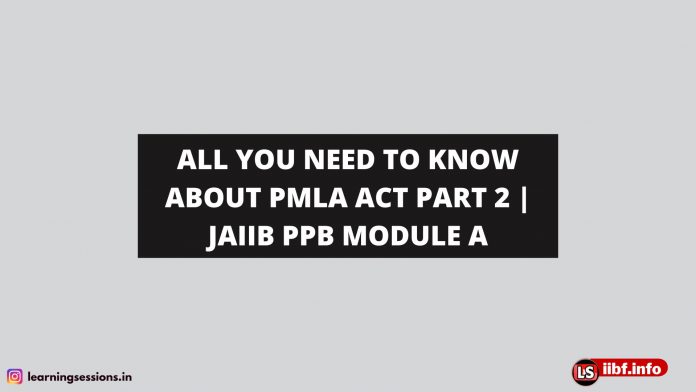
ALL YOU NEED TO KNOW ABOUT PMLA ACT PART 2 | JAIIB PPB MODULE A
This is 2nd part of the article on PMLA Act, 2002 where we are discussing the provisions of PMLA in detail for JAIIB.
Hey beautiful people!
How have you been (Please do tell in the comments)? So, in the last article, we took an overview of the Prevention of Money-laundering Act, 2002 & discussed why & how the PMLA is being implemented in India as per the applicable Junior Associate of the Indian Institute of Bankers Syllabus 2023.
This part of the article will talk about the provisions of the PMLA Act, 2002 to cover the unit under KYC/ AML/ CFT norms of Module A of PPB 2023.
| Section: 1 i.e. Act’s brief title, scope, and start date
Clause (1) This Act may be called the Prevention of Money laundering Act, 2002. Clause (2) It’s applicable in all the states of India. Clause (3)Any reference in any notified provision to the beginning of the PMLA Act shall be read as a reference to the beginning of that provision. It shall take effect on the date that the CG notifies in the Official Gazette. Note: PMLA Act, 2002 came into force on July 1, 2005. |
| Section: 2 i.e. Definitions under the Act
Subsection 1 states that unless the context otherwise requires: Clause (a) states that “Adjudicating Authority” is the one appointed under section 6(1); Clause (b) states that “Appellate Tribunal” is the Appellate Tribunal defined under section 25(2); Clause (c) states that “Assistant Director” is one appointed under section 49(1); Clause (d) “attachment” means prohibition on the transfer, conversion, disposition or movement of property by an order issued under Chapter III (ATTACHMENT, ADJUDICATION AND CONFISCATION – Section 5 to 11A); While the sub-clause (da) states that “authorised person” means an authorised person as defined in section 2(c) of the FEMA, 1999; Clause (e) “banking company” means a banking company or a co-operative bank to which the BR Act, 1949 applies & includes any bank or banking institution referred in section (51) of BR Act; Sub-clause (fa) states that “beneficial owner” means an individual who has the ultimate control or is the owner of a client of a reporting entity or the person on whose behalf a transaction is being conducted & includes a person who exercises ultimate effective control over a juridical person; Clause (g) states that “Chairperson” means the Chairperson of the Appellate Tribunal. Clause (l) “financial institution” means a financial institution which has been defined in clause (c) of section 45-1 of the RBI Act, 1934 and includes:
Clause (n) “intermediary” means: (i) a stockbroker, a banker or registrar to an issue, a share transfer agent (STA), a trustee to a trust deed, a merchant banker, a portfolio manager, an investment adviser, an underwriter, or any other intermediary involved in the securities market who is registered under section 12 of the SEBI Act, 1992; or (ii) an association which is registered or recognised under the Forward Contracts (Regulation) Act 1952 or is its’ member; or (iii) intermediary registered by the PFRDA; or (iv) a recognised stock exchange referred to in section 2(f) of the Securities Contracts (Regulation) Act, 1956; Clause (na) states that “investigation” includes all the proceedings under this Act conducted by the Director or by an authority authorised by CG under the Act for the evidence collection; Clause (ra) states that “offence of cross border implications”, means:
which would have constituted an offence specified in Part A, Part B or Part C of the Schedule of this Act, had it been committed in India and if the person involved sends all or some of the proceeds of such behaviour to India; or
Clause (s) defines the “person” which includes:
Clause (sa) defines “person carrying on designated profession or business” to be:
The definition of “proceeds of crime” under clause (u) is as follows:
clause (v) states that “property” means:
clause (y) states that “scheduled offence” means:
a Court of Session designated as a Special Court under section 43(1) is referred to as a “Special Court” in clause (z); Clause (za) defines “transfer” as any right, title, possession, or lien that is sold, acquired, mortgaged, pled, gifted, loaned, or otherwise transferred; clause (zb) “value” means the fair market value (FMV) of any property on date acquired (by any person), or if it can’t be determined, the date on which it is possessed by such person. |
JOIN JAIIB COURSE TO CLEAR IN FIRST ATTEMPT
So, these are the most relevant definitions that as a JAIIB candidate you must remember & understand to pass Principles & Practices of Banking Examination in the upcoming exams of 2023.
Do wait for the next series in the PMLA Notes for your continuous preparation of JAIIB Exam. Like mentioned previously, you can check out the online video lectures of Principles & Practices of Banking prepared by the expert faculty of Learning Sessions here: Learning Sessions
All the best for your PPB 2023 Exams!




